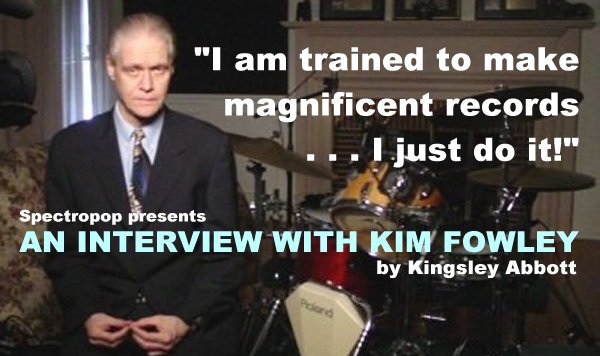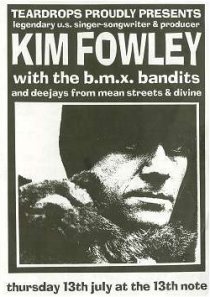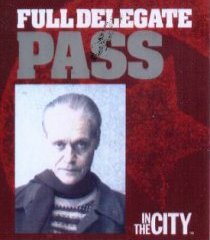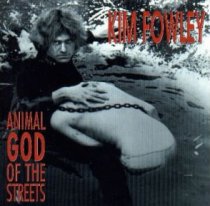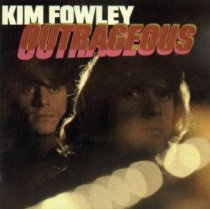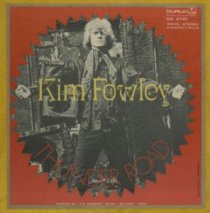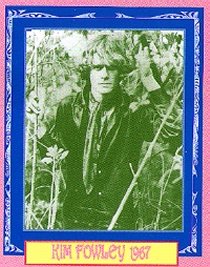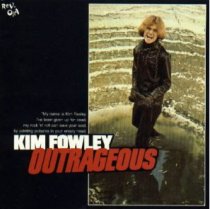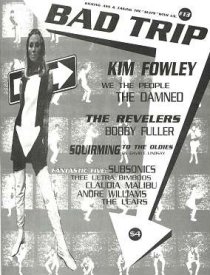| This is very rare, and it's the B-side. They must
have stolen it! I've never even seen this. This is very, very rare.
They were kids. Maybe they cut it again. You'll have to make a cassette
of it and send it to me.

OK, I have to go into the mode of being an intellectual
now. I read your book - you're a rock'n'roll intellectual, sir.
How come you never became a really big man in a major record company.
You've stayed at street level - was that purposeful?

Karl Engerman of Capitol interviewed me, and he said, "Kim,
you've never produced a great artist, you just make great records.
You've never had a Four Seasons or a Beach Boys. You've had one-offs
and studio bands, co-writing, B-sides, producing, album cuts or
five strangers pretending to be something else. Wonderful records,
but you didn't develop an artist. Plus, you are eccentric, you're
not corporate, you'd bring musicians to the offices and you would
do music in the offices, and you'd disturb the secretaries. We can't
have that. We can't have music in a music company, now can we!"
That was it. This was being rejected with a No 1 record in the United
States, co-owning the company and having seven chart records. I
had all kinds of things happening. There I was at 24. I wore a sports
jacket. I didn't have long hair. I didn't do drugs. I didn't do
alcohol. I was a really church-going young Bruce Johnston-classmate
guy, and after that I became an asshole.

Was it a major A&R position that you would have really wanted,
though?

I have the intellect, and I have the talent, to exist in any corporate
structure and make a lot of money. I had sold over two million records
at that time, so I had proved it. Right now I have a co-writing
credit with Kiss. So here I am at age 64, 45 years later, still
charting. I have five movies, I have three box sets, I have three
TVs and two books coming, and I don't know too many 23-year-old
A&R guys who can say that. So, Jesus did not design a digestible
corporate presence. I actually make music. I actually make records,
write them, create them. On my website there is a whole page that
says Kim Fowley Is For Sale. It tells all the things I do. I don't
have a girlfriend or a dog, and I don't lie. Because a girlfriend
couldn't handle this kind of life. The dog would bite the girlfriend
and make a mess on the floor, and that would be the end of them!

Is it the variety that appeals to you, or is there one aspect
of the business that you prefer?

No. Whenever I hear something worth recording, I record it. Regardless
of what it is, or where it is, or who it is. I record it because
it is there to be recorded. The way Alan Lomax had to go to the
cotton fields, pull the car over and say, "That's interesting".
An archivist. I'm a lot like the record collector mentality, except
I actually don't collect music, I create music. The more obscure
the better, the more isolated the better. Yes, I've had commercial
mainstream, but as Jerome Kern said, "Folk music of today is
the popular music of tomorrow" - dialogue in Showboat - so
what's underground now is mainstream in a couple of years from now.
Pink Floyd were once underground and are now mainstream. Sometimes
you wish you had produced the Tradewinds, but you didn't, but if
you ever run into the next Tradewinds you say, "OK, now I get
to make my Tradewinds record with these Portuguese guys!" You
run in there and you do it.

I'll go back now and make two more albums! The next Venus &
the Razorbaldes reunion album and finish up the second Sand album
which features Chris Darrow, and the Back Yard Ramblers which is
John York of the Byrds - he's surfacing again, if you remember him.
So that's what I'm doing when I go home. One day archaeologists
will find out that my total life's work is really remarkable. It's
a shame I didn't do it all in one genre, as I would have had more
recognition. But then I made a lot of money anyway, I had a good
time and I was able to occupy myself.

Going back to what you say about not settling on one genre,
is there a thread that does run through your music?

No. Joe Smith, who was president of Warner Electra, once said to
me that my stiffs even sound like records. Even my failures sound
like real records! It's like ER, Casualty over here - anything that
comes in they deal with. Anything that's good I deal with.

That's a good analogy because Casualty very much reflects what's
happening on the streets.

Yeah, so if I'm not allowed in the boardroom, I'll be in the gutter
looking for good sounds.

Do you prefer to be there?

No. I'd prefer to be in a whorehouse, having a good dinner, before…
When you find artists, what do you first look for? What do you
want to recognise?

I want to hear that radio voice. I want to hear that radio hook
in the music. And with the band I want to hear a tonality, a way
of tuning. If it's a soloist I want to hear a teardrop in the voice.
If it's fast I want to see teenagers hurling themselves through
the air. Manchester yobbos kicking heads against the curb. A trademark
sound. I want a record that's gonna change my life. I want something
miraculous. I want the next Beatles, the next Elvis, the next Abba,
the next Easybeats - these are all my favourites, of course - the
next Skyliners, the next Trashmen, the next Wilson Pickett.

The best thing that I've heard here in the UK that I've had nothing
to do with is the Broken Family Band, from Oxford, genius! Oh, Jesus,
it was so good. I wanted to call them up and try to grab it. It
was that good - like the Modern Lovers, fronted by Dennis Wilson
and Lou Reed's child singing music from an Earls Court bedsit. Here
I am plugging something… I've heard hundreds of things, but
hardly anything's real - but that was real. And then there's Tenshi.
They're a UK Dixie Chicks, doing a thinking man's Bananarama. Steve
T, the lead singer of Venus & the Razorblades, came up after
twenty years of being institutionalised, doing soul stuff by Wilson
Pickett - I didn't know he could do that! The only other person
who has even done that, like being out on the sidewalk, was Seymour
Stein from Sire Records. We'd meet and ask each other, "What've
you got?" If you have magic with confidence, then I'm a fan!

Are you still a singles man?

It's down to the song. It's now going to be the 60p download thing
that Richard Branson is starting. Here's what I predict: someone
in their bedroom makes four songs, puts up one at a time (on the
net), someone notices all the hits, and then they're on the website
and contact the band who are given money to do the rest of the album.
They're given money to get their college friends to bring over the
equipment and do the visuals, and then when a kid wants the album
he can even go to a traditional record store, asks for the album
and gets a DVD. That is the future, and the good news about that
is there won't be traditional A&R anymore, because if they can
get 10,000 people to download the singles, that's 40,000 sales out
of your bedroom. And then someone's going to come in to pay you
to finish it.

Will everybody have the ability to work that way?

Remember where we were pre-Elvis…or maybe pre- Beatles…after
1957 - '57 was the best year I think in rock'n'roll, the year that
I turned 18. We had the best stuff then. Back then we just had five
big labels with the majority of the market. We found a guy who gave
us some money and we made 'Alley Oop', the first No I hit that I
co-produced, by the Hollywood Argyles (Kim, Gary Paxton, Sandy Nelson
and friends). We pressed up 500 copies at first and soon it became
a No 1 record in the world. Alan Freed, my mentor, once said, "You
can't hurt a hit, but you can't cover up a miss." We made that
for $82. Later, "Popsicles And Icicles" by the Murmaids,
$108 to make. I have a shirt now that cost $108, the price of a
shirt paid for a No 1 hit record on the Record World chart that
the Beatles knocked off in 1963! It's easy, if someone has a piece
of equipment and someone can make a noise on it… Like the girls
taking baths on the internet!

Picking up on '57 as your best year, what do you see as key
songs and records through the decades that you have enjoyed?

In no particular order, 'Whispering Bells' by the Del Vikings is
the joy of life, 'High School Confidential' by Jerry Lee Lewis is
the darkness of life, 'Book Of Love' by the Monotones, 'Tonite Tonite'
by the Mello-Kings, 'The Joker' by Billy Myles - the pathos when
you've been rejected by the pretty girl. You can feel that music
and not feel so bad. 'Earth Angel' - wow, I kissed my first girl,
with a brace, to that record, and the food particles were in each
other's mouths, and the lettuce and tomato was right there! Later
in the '50s… Elvis didn't mean that much to me till 'Don't
Be Cruel'. I didn't hear the earlier stuff till later. The Sun stuff
didn't get distributed so much in California, so I didn't hear it.
It was all the stuff that Dick Clark was playing… 'Get A Job'
by the Silhouettes - you could drive and run into another car, feel
good about hurting people with all those fast living doo wop songs,
Dale Hawkins' 'Susie Q', Gene Vincent's 'Be-Bop-A-Lula'.

It was either for me songs to fight and thieve with or it was songs
to feel less in pain with. I suffered with polio then. I was crippled
in the late summer of '57, so my great summer ended as a cripple,
so it was time for me to get serious about my career and I realised
that I had to get out my wheelchair and crutches and canes. My father
didn't want to be seen with a cripple, so I was abandoned at the
polio hospital. Later, the police dumped me in the army for some
minor crimes I had perpetrated. I didn't even have a record player,
but I bought the records just to have them. God…astounding!
Woah! Then I heard Duane Eddy, Al Casey…then I came back…
Thomas Wayne singing 'Tragedy'. Wow! Heading down the freeway in
a $10 car, and hearing that! Then we had 'Alley Oop'. And the Skyliners,
the early stuff on Calico, and then Phil Spector producing his records
that were great. Allen Toussaint doing all the stuff for Minit Records,
with Chris Kenner - astounding records - you get to meet girls to
that music. Slim Harpo, some Jimmy Reed, Chuck Berry, Bo Diddley.
My first marijuana cigarette in the 9th grade - I was Catholic,
so we had to do it behind a Jewish temple to 'Bo Diddley' by Bo
Diddley! In hindsight, Elvis didn't get through to us in California.
In every part of America there's different radio, and for some reason
it didn't get through. 'Once In A While' (the Chimes) and 'Over
The Mountain' (Johnnie & Joe) were the ones that meant something.
And the great lost guy, Jimmy Williams, he was more deadly than
anyone on Sun Records. Period!

We're now around '61/'62. Of course, the Four Seasons. Bob Crewe's
a great producer. And all that Brill Building stuff. Bert Berns
- a genius. The Jarmels' 'A Little Bit Of Soap'. The Flamingos were
tremendous, but I didn't like the Dells. Eddie Cochran was God.
He let me hang out in the studio and watch him produce … he
was a record collector. He made me sit, almost at gun point and
listen to every track of Jackie Wilson's 'You Ain't Heard Nothin'
Yet' album. Eddie produced himself, and Jerry Capehart banged on
a suitcase. He produced that great record 'Opportunity' by Jewel
& Eddie, who were like a black Everly Brothers. (Jewel was Jewel
Akens of 'Birds & Bees' fame). He discovered the singer Glen
Campbell and produced 'Turn Around Look At Me'. Hey, you've got
me sounding like a record collector now! We're doing 'Return of
The Ink Spots' where the youngest guy is 78, and there's one in
there who is 90, and they still sound good!

By now it's early '60s - the Tradewinds were God, the Easybeats
were always God, the Swingin' Blue Jeans - I like them; I know it's
stupid. The Trashmen were really stupid. 'Little Girl' by the Syndicate
Of Sound. I thought '98.6' by Keith was genius, and the Four Tops.
Creedence was great. Tony Joe White did a concert with Booker T
& the MGs as his backing group - he was Elvis that night. The
Jackpots in Sweden, and Abba later. Del Shannon was wonderful early
on and later with Jeff Lynne and Tom Petty - someone should cover
that stuff. Alvin Stardust, Suzy Quatro and Mud - those are all
brilliant records - makes you feel stupid in a nice kind of trendy
way. ZZ Top, till they found synthesisers, were amazing - shame
on you guys!

Then by about '75 I stared making records that I just wasn't hearing
- the Runaways, Blue Oyster Cult, Helen Reddy, which was my Doris
Day period recycled. Of course I lived in different places, so I
wasn't hearing American music. I was getting hits in places like
Denmark, with people like Burnin' Red Ivanhoe.

What about the punk period?
I liked that song 'English Wipe Out' (999), and 'Peaches' by the
Stranglers. I never got the Clash - I got the concept, but not the
music until later. I got it then with 'London Calling'. Sex Pistols
were God.

Where were you working when this was happening?

I was doing the Runaways, which was a bit later - we didn't get
the Sex Pistols and Clash until later in California - we were behind,
remember. I had the Runaways and Venus & the Razorblades. We
charted twice during the Summer of Hate in Record Retailer with
'Punk-A-Rama' and 'I Wanna Be Where The Boys Are'. None of the others,
the Ramones or the Runaways sold as well. America didn't have punk
till way later with Black Flag and Minuteman - that was California
punk which wasn't the same as punk was in the UK. In New York, Punk
was all CBGB's stuff with Wayne County. Even Mink De Ville was lumped
in there. The Ramones of course were God. The first album was tremendous.
'Sheena Is a Punk Rocker' was good. The Eddie and the Hot Rods EP
was great.

Do you see any difference between working on the New York scene
and the LA scene?

I just turned up and made good records - anywhere, anytime. I made
between 3,000 and 5,000 records. Either I wrote it, I published
it, I produced it, I sang it or I brokered it. I don't even remember
that record you just showed me (the Patterns). I think I produced
the original song and they either pirated it or re-recorded it.
I never saw that record before.

The '80s and '90s?

Oh, what went on there…not much. I had two hits. One was Steel
Breeze's 'You Don't Want Me Any More'. One was top 20 and one No
17. Oh, I don't remember. We were on MTV and Billboard for a while.
I started doing TV and went to Australia and became a DJ. Did the
Byrds special for Discovery Network - John York reminded me of that
- me interviewing Rick Danko. Wow, there was a nice guy. And then…Poison,
Motley Crue, Guns'n'Roses...it's all on my website. Glam and metal
combined, glitter and metal - they called it Glam. Big hair bands
now. Then some gospel…and then in between I produced Leather
Nun, the sweetest guys, the Lou Reed of Sweden. I lived in Austin
then and I did Mexican music for grandmas and nine-year-olds, and
I wrote a book about baseball! Strange trip that was! Then Teenage
Fan Club in '95, and a hit in the UK Indie charts with 'Superstar'
by the Bombers. I tried to combine Blur and Oasis but nobody got
it past the single. By then in '96 I lived in New Orleans, looking
for the black music of the '20s, but couldn't find it.

Then at age 62, I dragged my crippled body back to Redlands where
I am living in an 1890s house right by the Californian desert and
I'm in the studio with Jimmy Stewart's second cousin with the drummer
from the Misunderstood. He's the next Earle Mankey, the next Gary
Paxton. I've always done well with co-producers. We're making a
lot of modern stuff, some retro stuff, some of the best records
of my career. Like the one that is available now in the UK called
Sand, featuring Kim Fowley. We have experimental stuff, jazz, pop,
phoney groups, 11-year-old kids and their uncles and nephews and
mothers recording now on an Archies level. I'm happy because I get
to make records again. It's my own choice. We're 75 minutes away
from LA, so we're undercutting the LA studios. Lots of people are
coming out for Europe and all over. And the next stop is the graveyard.
Why not? Might as well die - that'll be an interesting project.

If you had to stick with just one type of record, which would
it be?

Phoney group every time! I hate bands, because they're all assholes.
Let's talk about another producer you worked with…Phil
Spector

He produced me, but I didn't get royalties! ('Give It To Me', to
be found on the LP 'Phil Spector '74-'79'). He is a guy who took
Leonard Bernstein, Dimitri Tiomkin, and Richard Wagner and the lyrics
of True Confessions mass magazines. He threw them all together,
and made sure that they people who usually sang them were black
and didn't demand huge contracts. He sat there and had great singers,
songs and studio musicians. He made great sounding records. There's
a documentary coming out about him that includes the latest problems.

When Phil Spector and I exchanged bitter words in '92, he said,
"Fuck you, I'm a better producer than you!" I said, "You
were, but you quit! I continued and you didn't continue and that's
the difference. I did other things. I was a writer, a publisher;
you didn't have Kiss, or do "Stars On 45", or Joan Jett.
Nirvana didn't cover your songs. You haven't done anything since
"Black Pearl" (Checkmates Ltd) and "End Of The Century"
(Ramones) and something no-one ever heard from Celine Dion. You
don't count, but you do have a good catalogue." That shut him
up! He walked away.

Would you have wished to have produced some of the things he
did?

The only thing would have been the Christmas album. That was remarkable.
Why didn't I think of that?

You also spent some time over here with Joe Meek at his Holloway
Road studio.

He didn't approach me! He was very good at doing what he did. He
was very courteous. I remember his skin, very pale, like a turkey
under glass, almost like porcelain.

From your own productions, can you pick one single that you
are really proud of?

I don't have one. I was never that impressed with anything I ever
did.

Not one?

No, I haven't made that record yet. I know I will make a record
that remarkable one day - remember the date - September 18th 2003.
Between now and the day I die, I will make a record that you will
love. It will probably be that record. It will be unexpected and
appreciated by me. More impact that anything I did when I was younger.
I'm like a plodding journeyman, and I make these records the best
I can, doing the twelve different jobs outlined on the Kim Fowley
Is For Sale section on my website. I don't think about it too much.

Has you wide breadth of activity taken away from the chance
to produce the really fine records?

I think in my life even the hideous and the dumb things I did were
fascinating. I'm not really interested in other people's opinion
of me. I don't have an opinion of me. There's one fact: I was not
Lennon & McCartney, or George Gershwin, or Leiber & Stoller,
or George Martin. Sorry! But…I made some interesting recordings
in my time, certainly better than most of the people who bring me
demos today. I'm not a major talent, I'm a major presence. When
you look at the duration, it was a major effort with minor results.

When you look on your website, there are lots of references
pointing to all the things you have done. Is that a sort of insecurity?

There are people who would take credit for other people's work.
That's my way of saying "I did this". Other people think
you are lying about it, think you couldn't have done it all. I'm
not gracious about my hit records. I use bad taste in promoting
myself. No one promotes me, so I have to do it myself. I over-document.
I'm not a household name, so that's why I do it.

What's your greatest achievement in the music business?

Never grabbing a day job. I never did it part-time; I always did
it full-time.

And you always stayed at street level, with the rock'n'roll
pulse, rather than going to corporate companies.

Right, I'm never invited to any of them. I just do what comes along.
I operate on reflex. My idea of fun is to you to drive me to some
English town, drop me off, and then come back after three or four
days, and I would have found something that sounds good.

How do you keep that very active, positive approach?

Because I'm an asshole. I'm also immature emotionally. I don't
have a personal life. I define everything by the obscure activities
I do. You have to understand this: I was abandoned by my mother
in a foster home one- year-old, and I was raised by nine and
ten-year-olds till I was six. I was a polio guy and a cancer
guy and a pneumonia guy, and I was abandoned again by my dad.
I was left outside the door, out in the rain, out in the darkness.
I'll die alone, by myself, which is my destiny, my pattern.
If you're left alone by the whole human race, in the most
crucial parts of your life and development, you have a lot
of time to develop your musical identity and skills. You can't
wait to go out in public and show off. I am trained to make
magnificent records whenever possible. For whatever reason,
I just do it. It's better than watching the news. What else
am I going to do? Work at a fish and chip shop? "Hi,
do you want cod?" God! No, no, I'm one of the great ones.
|
